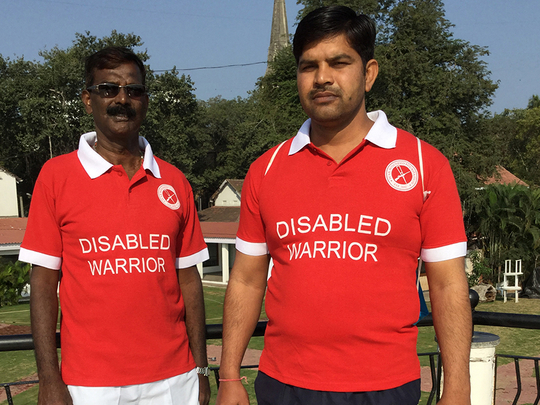
Mumbai: Thirteen army personnel disabled in war will be participating in the six-km Dream Run in the Mumbai Marathon on Sunday to prove they can do what others can and demonstrate that disability is not the end of a forgotten but brave soldier.
Also participating will be 10 disabled and ex-servicemen from the Paraplegic Rehabilitation Centre of Command Hospital, Pune, in the 1.75km champion with disability race of the marathon.
With the administrative support of the Indian Army, their participation is being coordinated by the War Wounded Foundation, an NGO, and will show to the people that “these men live less than complete lives due to injuries sustained in the line of duty while defending the country,” said Lieutenant General Vijay Oberoi, President of the Foundation in an interaction with reporters at the army officers institute this morning. He himself lost his right leg during the 1965 war with Pakistan when he was a young captain who chose to soldier on in his regiment — Maratha Light Infantry. Despite his disability, he rose steadily up the ranks in the Army, till he retired as the Vice Chief of Army Staff on September 30, 2001.
“For the last five years, our boys have been enthusiastically taking part in the Mumbai Marathon,” said Oberoi, “to establish the fact that they can go to the front and be posted in field areas, depending on their [level of] disability.”
Another optimistic veteran is Major General Ian Cardozo, who as a young major, was dropped behind enemy lines with his battalion in the Indian Army’s first heliborne operation in Bangladesh. He was grievously wounded due to a mine-blast injury and their medical facilities had been destroyed. So the officer had to amputate his own leg using a ‘khukri’. He rose to the rank of Major General despite his disability.
Their stories of courage and suffering during military operations are a soul-stirring experience and many ex-soldiers feel their countrymen may have forgotten their sacrifice.
Lance Naik Ashok Kumar of Batallion (16 Grenadiers) was only 24 during the Kargil War when just before the final day, Vijay Diwas (victory day), on July 26, 1999 he and 30 others of other ranks were on Tiger Hill and were surrounded by the enemy. “Six of our soldiers died instantly in the ‘aamne-saamne’ firing and I was severely injured on one side. Despondently, I thought I should also not live any more when I heard my colleague abusing the enemy. That gave me a boost to carry on.
“Though no medical help came immediately and I had to spend the night in the mountains where minus 14-15 degrees C is normal, I think I didn’t lose much blood because of the extreme cold.” Later he fell from the stretcher when being taken to a helicopter which was also downed. It took all of three days to take him to a military hospital in Dras when his treatment began. Seven years later, he retired from the army hoping to revert to his ancestral occupation of farming in Haryana only to find that all his 28-acre land had been usurped. His fight against corruption has not ended and “thanks to Baba Ramdev and Sri Sri Ravi Shankar, I am mentally and psychologically strong,” he says.
“Participating in the marathon is a result of my inner strength and it boosts my morale to see war veterans joining in this event.”
Another plucky soldier, Honorary Captain P Dhayalan (retired) of 8 Engineer Regiment also sustained grave injuries in a mine blast in Jaffna, Sri Lanka, when he was with the Indian Peace Keeping Force in 1987 “We were on duty defusing mines laid by the LTTE in public places. Whilst trying to defuse one near the post office where I saw booby traps, I told my officers to wait behind me, but the LTTE fired the IED by remote control and my task force behind me was injured and most died within 24 hours.”
Miraculously, he survived — though losing two fingers, one eye and sustaining burn injuries all over — after being saved by fishermen. Medical help came fast and quick as he was shifted to a government hospital, then military hospital in Chennai and then to the Command Hospital in Pune in a matter of days. “I was unconscious for 30 days and when I became conscious I had a socket in one eye in which an artificial one was later fixed.”
He returned to the unit after a year, when he was given the gallantry award, and retired as Subedar Major.
Like other ex-soldiers, he too, is eagerly looking forward to taking part in the Mumbai Marathon.












